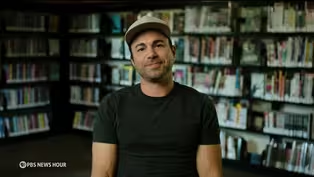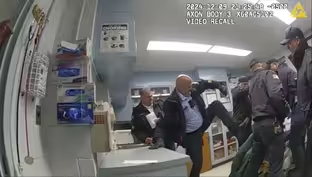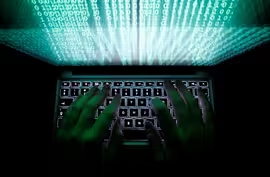
College football's expanded playoff is reshaping the sport
Clip: 12/31/2024 | 7m 21sVideo has Closed Captions
How the expanded playoff and unprecedented money is reshaping college football
The College Football Playoff, which was recently expanded to 12 teams, is pouring money into the sport in ways never before seen. ESPN is reportedly paying more than $1.3 billion to televise these games and some players are now receiving millions of dollars themselves. William Brangham discussed how this money is impacting the sport with Pablo Torre of "Pablo Torre Finds Out."
Problems playing video? | Closed Captioning Feedback
Problems playing video? | Closed Captioning Feedback
Major corporate funding for the PBS News Hour is provided by BDO, BNSF, Consumer Cellular, American Cruise Lines, and Raymond James. Funding for the PBS NewsHour Weekend is provided by...

College football's expanded playoff is reshaping the sport
Clip: 12/31/2024 | 7m 21sVideo has Closed Captions
The College Football Playoff, which was recently expanded to 12 teams, is pouring money into the sport in ways never before seen. ESPN is reportedly paying more than $1.3 billion to televise these games and some players are now receiving millions of dollars themselves. William Brangham discussed how this money is impacting the sport with Pablo Torre of "Pablo Torre Finds Out."
Problems playing video? | Closed Captioning Feedback
How to Watch PBS News Hour
PBS News Hour is available to stream on pbs.org and the free PBS App, available on iPhone, Apple TV, Android TV, Android smartphones, Amazon Fire TV, Amazon Fire Tablet, Roku, Samsung Smart TV, and Vizio.
Providing Support for PBS.org
Learn Moreabout PBS online sponsorshipNICK SCHIFRIN: The college football playoff, which recently expanded to 12 teams, resumes tonight.
And unprecedented money is pouring in.
ESPN is reportedly paying more than $1.3 billion to televise these games, and some players are now receiving millions.
William Brangham talks with sports journalist Pablo Torre, who hosts the podcast "Pablo Torre Finds Out," about a brave new world for college football.
WILLIAM BRANGHAM: Pablo Torre, so good to have you on the "News Hour."
So imagine some of our audience has not been paying attention to all of this, and they're now waking up and seeing this new playoff structure in college athletics.
What is going on there?
What was the rationale for this, and how has it been playing out so far?
PABLO TORRE, Host, "Pablo Torre Finds Out": Yes, if you have been hibernating, welcome to the new age of college football.
It's very strange in some key ways, but also flowing from a logic that I think is fairly ancient within the sport when it comes to the playoff system specifically, which is that the most valuable property in televised sports in general has always been playoff games.
And so, when it comes to college football, the most valuable of all of the college sports, it's always been logical that more games, expansion to 12 teams, it's more football.
And America's demand for football, William, is inelastic.
That remains true.
And so this is just yet more profit, yet more billions of dollars accruing to a sport that is also grappling simultaneously with how much to give those to the players that actually comprise the product.
WILLIAM BRANGHAM: And that is the other big shift that is going on here, this -- what's called name image, likeness, where college players, after this being considered a taboo forever in college football, now those players are getting enormous sums of money.
How did that changeover happen?
PABLO TORRE: Yes, it's a half-measure, but it is radical because of that ideology fundamentally that you described, which is that these are student athletes.
These are not employees.
And that's been the NCAA, the governing national body of college sports -- that's been their core tenant the entire time is that these are college kids.
But it came to a head at the Supreme Court where there was a 9-0 decision in favor of Shawne Alston, a former West Virginia running back, who was the head of a class that sued the NCAA for back pay, for basically the right to have monetized their name, image and likeness.
And so what they argued successfully in front of the Supreme Court to a 9-0 decision, Brett Kavanaugh excoriated the NCAA for trying to block what seems obvious now, which is that a student athlete is in fact a person that should be able to monetize their own likeness.
And so it wasn't quite yet pay for play, which the NCAA is still fighting, but it was the ability to get money for how your image had been monetized by all of the players in the college sports economy.
And so it was the highest court in the land that opened the floodgates that led to some radical change.
WILLIAM BRANGHAM: How does that mechanism happen?
Because, again, that was considered, for people who are not really paying attention to this, the grand taboo.
If you got caught buying a Jaguar for some young player, that was a huge no-no.
Now money is flowing to these kids.
PABLO TORRE: When it comes to the individual players being paid, they are being paid by these third parties, these third-party companies that could be anywhere, as familiar to you as your local auto dealership in a college town all the way up to a big multinational corporation.
And the ostensible justification for why this is allowed is that this is a marketing deal for the players for their name, image and likeness.
This is not paying for performance.
This is basically them cutting a series of advertisements.
But it's been very obvious from the beginning that there really is no good philosophical or, frankly, constitutional way to delineate between you are getting this money because you are good at something versus you are getting this money because you are famous enough to provide some marketing value for the company that is paying you to endorse them.
WILLIAM BRANGHAM: The most notorious example, a recent moment was this player who had promised himself to LSU, but now all of a sudden he's playing for the University of Michigan.
Tell us that story.
PABLO TORRE: Yes, so this is the star quarterback in the incoming freshman class.
And his name is Bryce Underwood.
And all you need to know about him is that he has been the high water mark when it comes to both, I would say, the market economy, but also the absurdity of college football, because his main benefactor, his booster, so to speak, has been Larry Ellison, who is, of course, former Oracle CEO, a billionaire many times over, somebody who has apparently entered a relationship with a woman who is his fifth or sixth wife.
I say that with the ambiguity built in because it's not clear, but we know that it's the case because she, the woman in question, is an enormous Michigan football fan.
And so Larry Ellison, in conjunction with the new seemingly love of his life, decided to fund the greatest gift you could give to a Michigan football fan, which is the next great star quarterback.
And so it is football mercantilism in a sense.
It is also familiar, in the sense of these kids have always been the hottest commodities, but now we are getting a peek behind what used to be a pretty opaque curtain.
WILLIAM BRANGHAM: The rationale for a lot of this was that it was always unfair that these young athletes played sports for these schools and the schools got enormous amounts of money from their performance.
And this is now supposedly tipping the balance back in favor of the athletes.
But it's hard not to see that this is also being corrupted in other extremely unfair ways.
I mean, do you see it that way?
PABLO TORRE: Well, it's certainly the Wild West.
And that is a term of art that maybe undersells the absurdity that we mentioned, right?
In terms of what it's doing to the product that can be disquieting to people who love college football, as we understood it for decades, is that it is certainly killing the fictionalized version of what college sports has been.
Now what you're getting is the capitalism that had been restricted released in front of you in a way that does logically gesture towards a future where this is merely the minor leagues for professional sports, for the NFL itself.
And so much of the magic of college football, the reason why this week and throughout this playoff system you will see these tribal loyalties come to the fore in ways that are both insane and also heartwarming -- so I would say that it is fair to the athletes who are now getting to monetize something, after not having access to those billions of dollars that they generated, but entertainment and equity are not quite the same thing.
It may not be the sport you loved, the sport that you may watch in the years to come, because it will be different.
It will be less fictionalized in the ways that maybe you fell in love with in the first place.
WILLIAM BRANGHAM: Pablo Torre, thank you so much for sharing all your insights with us.
PABLO TORRE: Thank you, William.
A Brief But Spectacular take on being amazed at the world
Video has Closed Captions
Clip: 12/31/2024 | 3m 42s | Mark Rober's Brief But Spectacular take on being amazed at the world around us (3m 42s)
Death of man beaten by corrections officers sparks outrage
Video has Closed Captions
Clip: 12/31/2024 | 2m 57s | Death of New York man beaten by corrections officers sparks outrage and protests (2m 57s)
How artificial intelligence affected our lives in 2024
Video has Closed Captions
Clip: 12/31/2024 | 6m 33s | How artificial intelligence impacted our lives in 2024 and what's next (6m 33s)
New mothers face barriers getting mental health care
Video has Closed Captions
Clip: 12/31/2024 | 9m 13s | New mothers face barriers getting the mental health care so many need (9m 13s)
Officials were worried about barrier hit by Jeju Air flight
Video has Closed Captions
Clip: 12/31/2024 | 4m 42s | South Korean officials were worried about barrier before it was struck by Jeju Air flight (4m 42s)
U.N. says Gaza's health care system at brink of collapse
Video has Closed Captions
Clip: 12/31/2024 | 11m 35s | U.N. accuses Israel of pushing Gaza health system to ‘brink of total collapse' (11m 35s)
Providing Support for PBS.org
Learn Moreabout PBS online sponsorship
- News and Public Affairs

FRONTLINE is investigative journalism that questions, explains and changes our world.

- News and Public Affairs

Amanpour and Company features conversations with leaders and decision makers.












Support for PBS provided by:
Major corporate funding for the PBS News Hour is provided by BDO, BNSF, Consumer Cellular, American Cruise Lines, and Raymond James. Funding for the PBS NewsHour Weekend is provided by...






